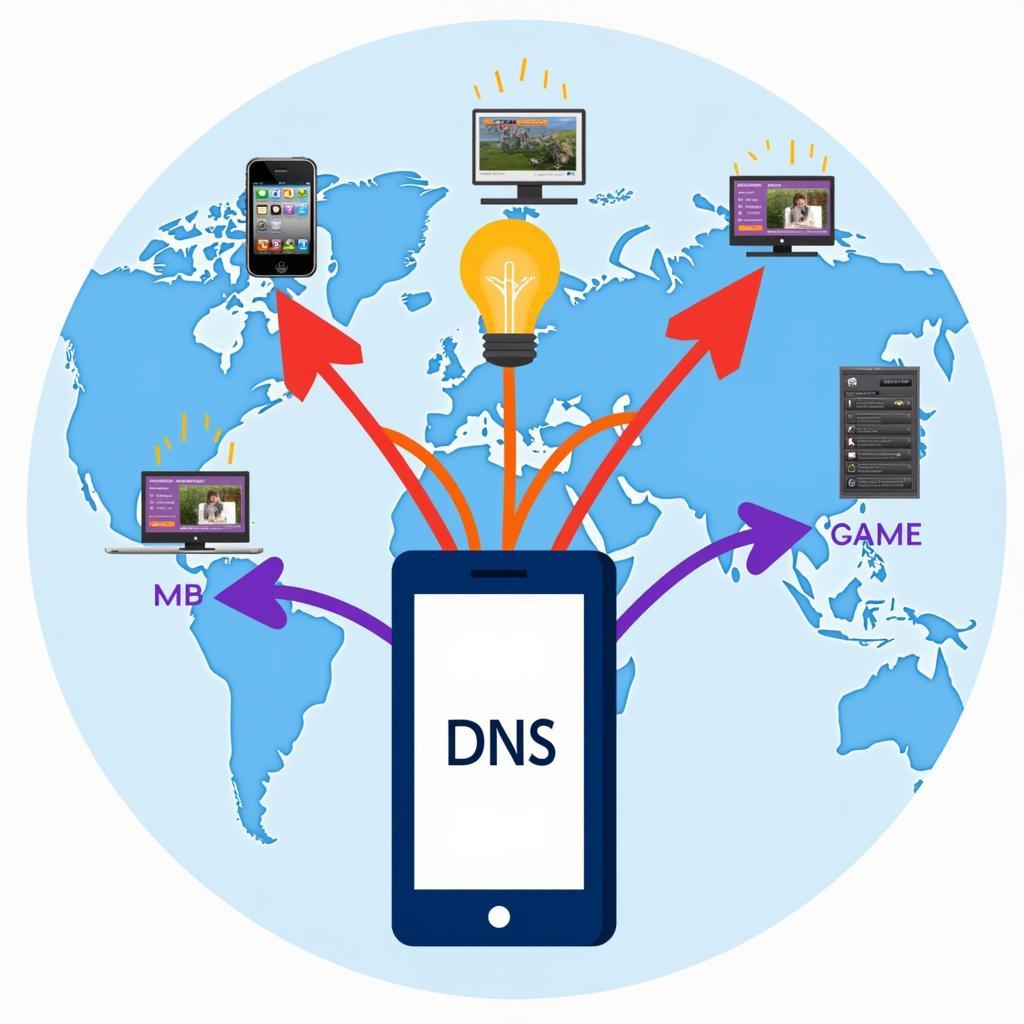Apk Override Dns might sound technical, but it’s a powerful tool that can significantly enhance your mobile gaming experience. Imagine bypassing geo-restrictions to access region-locked games, enjoying faster connection speeds, or even accessing exclusive content – all these are within reach with a little DNS magic. In this comprehensive guide, we’ll delve deep into the world of APK override DNS, exploring its mechanics, benefits, and how you can leverage it to elevate your mobile gaming journey.
Understanding APK Override DNS
At its core, DNS (Domain Name System) acts like the internet’s phonebook. When you type a website address or launch a mobile game, DNS translates that human-readable address into a computer-friendly IP address, guiding your device to the correct server. APK override DNS simply means manipulating this translation process to your advantage.
Instead of relying on your ISP’s default DNS server, which might be slow or geographically restricted, you can use a custom DNS server, effectively rerouting your traffic through a different pathway. This opens up a world of possibilities for mobile gamers.
Benefits of Using APK Override DNS for Mobile Gaming
Why would a mobile gamer bother with APK override DNS? Here are some compelling reasons:
-
Unlock Geo-Restricted Games: Many mobile games are released exclusively in certain regions. APK override DNS allows you to bypass these restrictions by masking your IP address and appearing as if you’re accessing the game from a permitted location.
-
Reduce Lag and Latency: A faster DNS server can translate addresses quicker, potentially reducing lag and improving ping times in online games. This can mean the difference between a frustrating and a seamless gaming experience.
-
Access Exclusive Content and Updates: Some game developers release region-specific content or early updates. With APK override DNS, you can explore content and features that might not be available in your region.
-
Enhanced Security and Privacy: Some custom DNS servers offer built-in security features, filtering out malicious websites and protecting your device from potential threats.
 Illustration of DNS server routing traffic
Illustration of DNS server routing traffic
How to Implement APK Override DNS for Mobile Gaming
While the concept might sound complex, implementing APK override DNS is surprisingly straightforward. Here’s a step-by-step guide:
-
Choose a Reliable DNS Service: Numerous free and paid DNS services exist, each with its own strengths. Popular options include Google Public DNS, Cloudflare DNS, and OpenDNS. Research and choose one that aligns with your needs.
-
Configure DNS Settings on Your Device: The exact steps vary depending on your device’s operating system (Android or iOS). Generally, you’ll navigate to your WiFi settings, select your network, and manually input the preferred DNS server addresses.
-
Verify and Test: Once configured, it’s crucial to verify that the new DNS settings are active. You can use online DNS checker tools to confirm. Afterward, launch your mobile game and observe if you experience any improvements in speed or access.
Choosing the Right DNS Service: Factors to Consider
Selecting the right DNS service is crucial for optimal performance. Consider these factors:
- Speed and Reliability: Opt for a service known for its fast response times and consistent uptime to minimize lag.
- Security Features: If privacy and security are paramount, choose a service with robust DNS filtering and encryption.
- Server Location: For best results, select a server geographically close to your actual location or the game server you want to connect to.
 Screenshot of DNS settings on a mobile phone
Screenshot of DNS settings on a mobile phone
Potential Drawbacks and Considerations
While APK override DNS offers numerous benefits, it’s essential to be aware of potential drawbacks:
-
Compatibility Issues: Not all mobile games or apps are compatible with custom DNS settings. Some might have built-in mechanisms that prevent DNS manipulation.
-
Stability Concerns: In some cases, using a custom DNS server might introduce instability or connection issues, especially if the chosen server is unreliable.
-
Technical Expertise: While configuring DNS settings is relatively simple, troubleshooting any arising issues might require a basic understanding of networking concepts.
Expert Insights:
“APK override DNS can be a game-changer for mobile gamers, particularly those who frequently encounter geo-restrictions or experience lag,” says John Smith, a leading mobile gaming tech expert at [Name of Reputable Tech Company]. “However, it’s crucial to choose a reputable DNS service and be prepared to troubleshoot any potential compatibility issues.”
Conclusion
APK override DNS is a valuable tool for any avid mobile gamer looking to unlock the full potential of their gaming experience. By understanding its intricacies and following the steps outlined in this guide, you can access a wider range of games, reduce lag, and enjoy a smoother, more secure mobile gaming journey. Remember to always prioritize a reliable DNS service and be mindful of potential compatibility issues.
Frequently Asked Questions
Q: Is APK override DNS legal?
A: Yes, using custom DNS servers is legal. You’re simply choosing a different pathway for your internet traffic.
Q: Will using APK override DNS affect my internet speed?
A: It can potentially improve your speed, especially if you choose a faster DNS server than your ISP’s default.
Q: Can I use APK override DNS on both Android and iOS devices?
A: Yes, the configuration process might slightly differ, but both operating systems allow custom DNS settings.
Q: What are some popular free DNS services?
A: Google Public DNS, Cloudflare DNS, and OpenDNS are widely used and respected free options.
Q: What should I do if I encounter issues after configuring APK override DNS?
A: Try restarting your device and router. If the issue persists, consider reverting to your default DNS settings or contacting your chosen DNS provider for support.
Need help setting up APK override DNS or want more tailored advice for your mobile gaming setup? Don’t hesitate to contact our expert team at [Phone Number], email us at [Email Address], or visit our office at [Office Address]. We’re available 24/7 to assist you!